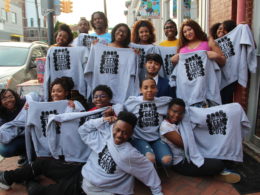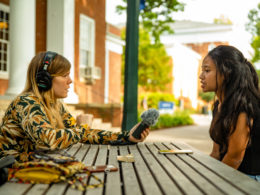In a year filled with a plethora of uncertainty, many nonprofit organizations were forced to say, “see you next year!” Unfortunately, for Comfort Zone Camp, next year wasn’t an option. With over 50,000 kids nationwide suffering parental loss due to COVID-19, the pandemic only expanded a need for its services.
Comfort Zone Camp (CZC) is a nonprofit bereavement organization that provides children with a fun and safe place to grieve, heal and grow. The free-of-charge camp focuses on kids who’ve experienced the death of a parent, sibling, primary caregiver or other significant person.
Virtual changes
Like many organizations, going virtual was a big adjustment for CZC. The camp canceled all its in-person events and programs in order for the team to rethink how to keep the camp community together.
“Going virtual was very difficult for us because, how do you keep kids engaged? How do you keep your volunteers engaged,” said Anne-Marie Worthy, CZC’s director of development. “At camp, you can do a game, but you don’t have to plan every second to keep everyone engaged.”
The biggest challenge of going virtual was ensuring that isolated, grieving children felt connected, even if that meant through a screen. The CZC team harnessed its creative side and drew in the community through virtual scavenger hunts, ice breakers and even happy hours for the adult volunteers.
Expanding to new waters
Last fall, the camp began to brainstorm new ways to assist its child campers. Through its new Comfort Zone at Home program, campers were able to get involved virtually and still have an enriched camp experience from the comfort of their own home.
CZC didn’t stop there. Last fall, the camp also created a socially distanced, in-person Family Camp program so whole families could heal and grow together. This program allows families to sleep and eat together, but during the day, the kids go to healing circles with kids their own age, while guardians go separately to work on their grief following the same model.
Rather than having 30 strangers sharing a cabin, Family Camps let families living in the same household share the essential tight spaces. This new set-up did more than stop the spread of COVID-19. It also proved to be a powerful form of healing.
“The impact was enormous, but we’re also aware that, unfortunately, not every kid has somebody that can go with them. So, we’re still offering our traditional camps along with family ones in the future,” said Worthy.
With an already successful model, CZC isn’t concerned with fixing something that’s broken but rather re-imagining something that has proven success and making it work harder for children and families who need it most. In the future, Comfort Zone is pushing to expand into friend loss and supporting kids who have lost their teammates, classmates and best friends.
Getting involved
If you are considering reaching out to Comfort Zone Camp for help, know that it is an entirely free-of-chargehealing experience. It’s also important to note that CZC programs are for children experiencing loss, whether that loss happened in the last few weeks to years in the past. If a child has an important person in life that’s missing, that hole doesn’t just go away. There’s no expiration date on grief.
“Studies show, if you don’t address their grief, they’re five times more likely to die by suicide. They’re nine times more likely to drop out of high school and 10 times more likely to do drugs,” said Worthy.
The simple sign-up process begins by filling out a submission online. From there, the camp calls the child’s guardian to make sure that the program is a perfect fit for the child. The call allows Comfort Zone to provide its campers with a personalized experience.
Registration is now in full swing, and volunteer training begins on August 7. You can read more on its website at comfortzonecamp.org or donate here.
If you are interested in following the CZC journey, you can follow Comfort Zone Camp on Facebook, Twitterand Instagram.










